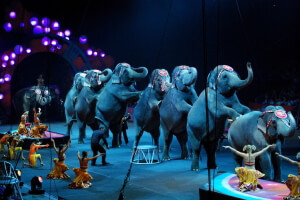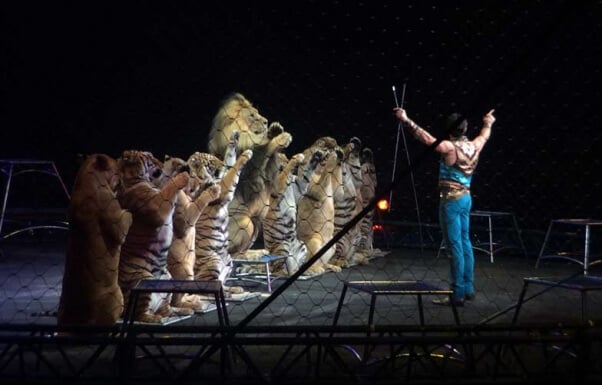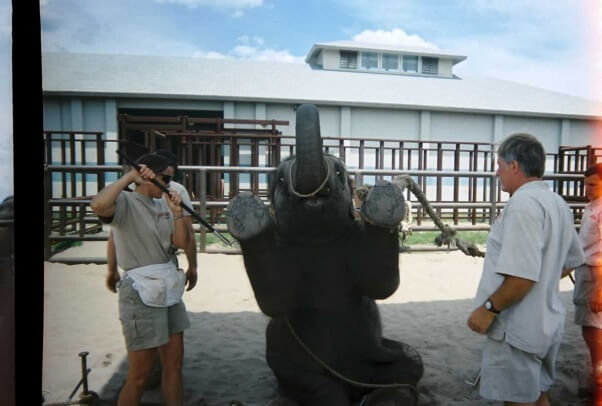
It may come as a surprise to most people that PETA loves the circus.
What PETA doesn’t love is to see animals forced to spend a lifetime in chains and cramped cages, in boxcars and basements—torn from their families and denied all freedom so that they can be forced to perform tricks that fatten someone’s bottom line. In the end, faced with the photos and videos of how these wild animals fare in captivity, most people agreed with us.
Ringling Bros. and Barnum & Bailey Circus has dragged what used to be called its “beast wagons” from town to town since 1871, but the tent pegs are being pulled up for the last time. Ringling will go dark after its May 21 performance in Uniondale, New York.

Circuses around the world that beat Ringling to the punch in making the decision to stop using animals are thriving. But Ringling stonewalled for decades, hoping that the mounting protests by people who care about animals’ welfare—PETA members and supporters, other animal rights organizations and grassroots groups that challenged the circus at every stop in every city—would somehow disappear. It was a terrible miscalculation.
So, whether it was simple denial or sheer hubris, Ringling clung to its cruel, archaic business model even as its attendance figures reached rock bottom. It’s hard to fathom now all the things that it long defended. For example, PETA exposed how the circus broke the spirit of baby elephants—they were torn from their frantic, loving mothers and forced to stand on crippling concrete for up to 23 hours a day. Tied by all four legs, they were shocked with electric prods and beaten with heavy, steel-tipped bullhooks until they learned to obey out of fear.

Elephant calf coerced into an unnatural posture using bullhooks and ropes at the Center for Elephant Conservation.
Video shot during a PETA investigation showed Ringling trainers beating adult elephants in the face as they were lining up obediently before a performance.
Last year, an animal behaviorist with 25 years’ experience released a scathing report documenting the dire physical condition of tigers used by Ringling.
Astoundingly, even after Ringling’s parent company, Feld Entertainment, paid a $270,000 fine—the largest penalty in circus history—to settle multiple violations of the federal Animal Welfare Act, Ringling continued to defend the indefensible. A few years later, though, a crack appeared in the façade.
Citing a public “mood shift,” in March 2015 the circus announced that it would pull elephants off the road by 2018, a decision that was also prompted by bullhook bans in municipalities across the country as well as ordinances banning circuses and other acts that use wild and exotic animals.
But while the public supported Ringling’s long-overdue decision, few people were satisfied. After all, it wasn’t just elephants who suffer in the circus. And those who knew the elephants’ plight, weren’t going to rest while elephants, some lame, were still going to be hauled around the country for another three years. More than a quarter-million people signed a PETA petition calling for the elephants to be taken off the road immediately. Demonstrations were held at every venue.
Finally, Ringling caved. It pulled its elephant acts in May 2016. They didn’t go to a sanctuary, though, despite calls for that to happen. Instead, they went to Ringling’s Florida breeding compound, where they are still chained—typically by one foreleg and one hind leg so that they can’t move more than a step or two in any direction.
What does the collapse of “The Saddest Show on Earth” portend for UniverSoul Circus, Carson & Barnes Circus, Carden Circus International and other old-style animal circuses and traveling shows? The same thing it portends for SeaWorld, the Miami Seaquarium and other marine parks, where orcas and dolphins float listlessly in tiny, barren, concrete tanks: Unless they evolve by leaving out animal acts, their days are numbered, too.
Some of them are already starting to get the picture.
The Rochester, New York, Shriners dropped their circus after more than 80 years because it was losing money; the Ramos Bros. Circus, which this year eliminated all animal acts except for dogs, is now drawing massive crowds; and the National Aquarium is sending its bottlenose dolphins to a seaside sanctuary where they will experience some semblance of a natural life. “Times have changed, and our understanding of the needs of the animals in our care has changed,” one official said.
The owners of Circus Vargas gave a similar reason when they dropped animal acts in 2010. “We felt the time was coming for a change.”
Thanks to an educated public, yes—the time has come.
The post The Curtain Comes Down on Ringling appeared first on PETA.
